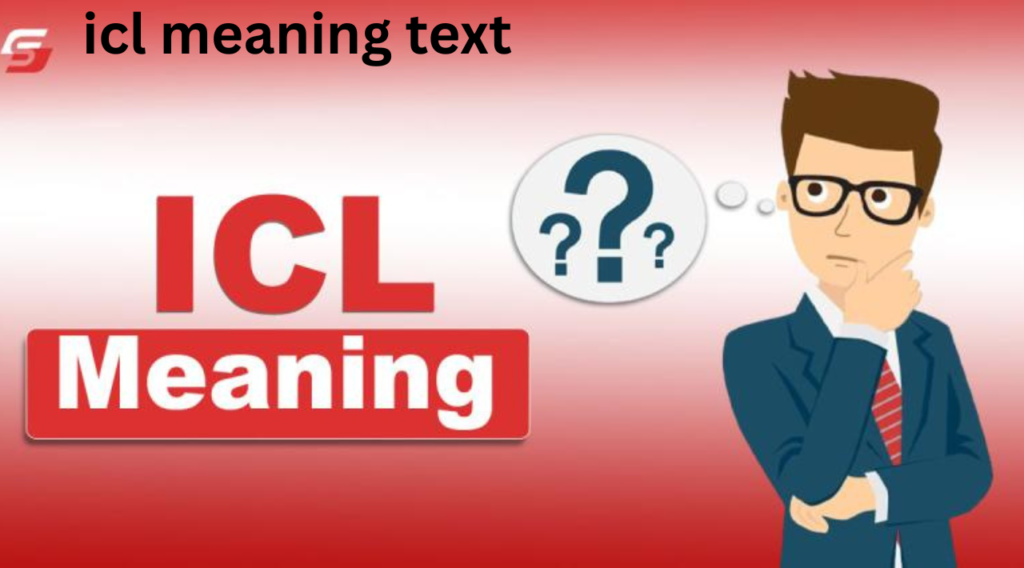icl meaning text Decoding the Popular Slang in Digital Conversations
In the fast-evolving world of digital communication, brevity and expression go hand in hand. Whether you’re chatting on Snapchat,icl meaning text Instagram, or just texting a friend, chances are you’ve come across cryptic acronyms like ICL, LOL, or IMO. These shorthand expressions are part of a growing internet language designed for speed and impact, particularly among younger audiences who thrive on staying current.
But what does ICL really mean? And why is it suddenly popping up in so many social media captions and chat threads? As communication icl meaning text digital space, understanding modern slang isn’t just for teens—it’s becoming essential for anyone wanting to keep up in both casual and professional digital environments.
This article breaks down the meaning of ICL, explores its usage across platforms, and discusses the cultural significance oficl meaning text ‘s online world. Whether you’re a parent trying to decode your child’s texts or a digital native looking to sharpen your slang game, this guide has you covered.
What Does “ICL” Mean in Text?

The acronym ICL stands for “I Can’t Lie” and is used in digital communication to preface a statement of honesty, vulnerability, or blunt opinion. It’s often inserted at the beginning or middle of a sentence to add emotional weight or sincerity. For example, someone might text, “ICL, that movie made me cry,” or “ICL, you were right about that situation.”
The beauty of ICL lies in its simplicity—it’s short, expressive, and conveys authenticity. In a world where conversations can feel icl meaning text, phrases like “I can’t lie” offer a refreshing burst of truth. That’s why users turn to ICL when they want to sound relatable or real. It sets the tone for a confession, a raw opinion, or an unfiltered thought.
What makes ICL even more impactful is how it bridges emotional and conversational tone. Saying “I can’t lie” signals to the recipient that what follows is meaningful, whether it’s a compliment, criticism, or confession. It adds a layer of trust to the digital dialogue, making it popular among close friends, romantic interests, or online personalities who want to appear genuine with their audience.
In short, ICL is not just a trendy acronym—it’s a digital cue for sincerity, often used to signal that the speaker is about to get real.
The Evolution of Text Slang and Acronyms
The internet has changed how we speak, write, and connect. With character limits, instant messaging, and rapid-fire conversations, users began shortening common phrases for efficiency. That’s how abbreviations like LOL (“laugh out loud”), TMI (“too much information”), and ICL came into being.
Over time, text slang evolved into a language of its own—fast, creative, and emotionally expressive. Acronyms now serve not only to save time but to convey tone, personality, and intent. “ICL” fits perfectly into this landscape because it’s emotionally charged while still being short and punchy.
Texting acronyms also reflect the dynamics of digital identity. Teens, influencers, and Gen Z users often adopt and adapt these terms to create a sense of in-group familiarity. If you know what ICL means, you’re considered part of the conversation. If you don’t, you’re out of the loop—at least momentarily.
Interestingly, some slang terms start on one platform and migrate across others. While ICL may have started in private messages or niche groups, its use has spread to platforms like TikTok captions, Twitter posts, and even YouTube comments. Its simplicity and emotional clarity make it versatile across all digital touchpoints.
In essence, acronyms like ICL are more than shortcuts—they’re linguistic innovations that reflect how we connect in the digital age.
Where and How ICL is Commonly Used
ICL is most commonly used in informal online conversations, particularly on platforms like Snapchat, Instagram, Twitter (X), TikTok, and text messages. It often appears at the start of a sentence to introduce an honest remark or heartfelt comment. For example: “ICL, I miss the old version of you” or “ICL, this trend is getting out of hand.”
Among social media users—especially Gen Z and millennials—ICL adds flavor and relatability to posts. On TikTok, for instance, creators might use it in captions to express a candid thought, such as: “ICL, this song hits different at 2 AM.” It’s these little expressions that make content more emotionally accessible and foster engagement.
In group chats and one-on-one texts, ICL serves a more personal role. It’s used to soften or emphasize truth, similar to how people might say “honestly” or “not gonna lie” in conversation. The phrase allows the sender to share feelings without sounding confrontational or overly dramatic.
Interestingly, the tone of ICL can vary based on context. Sometimes it’s used playfully—“ICL, pineapple does belong on pizza”—while other times it’s more serious or introspective—“ICL, I haven’t been feeling like myself lately.” Understanding these tone shifts is key to interpreting the phrase correctly and responding appropriately.
Interpreting ICL: Nuances, Intent, and Cultural Meaning
Like many digital expressions, the meaning of ICL can be nuanced. While its core definition is “I Can’t Lie,” its usage can convey different emotions depending on the context. In a supportive conversation, it can introduce vulnerability: “ICL, I’m struggling right now.” In a debate, it might signal a bold opinion: “ICL, your argument doesn’t make sense.” In a lighthearted chat, it might just preface a fun confession: “ICL, I watched the whole season in one night.”
These subtle variations make ICL a powerful tool in text-based communication. Since digital messaging lacks facial expressions and body language, users rely on abbreviations like ICL to inject tone and authenticity. It can act as a cue for empathy, sarcasm, or sincerity—depending entirely on how it’s framed.
Culturally, the popularity of ICL reflects a larger shift toward vulnerability and openness in digital spaces. People are increasingly encouraged to “keep it real” online, and phrases like ICL help facilitate that trend. It breaks down emotional walls in a fast-paced, emoji-filled world.
So while it might seem like just another three-letter acronym, ICL plays a subtle but significant role in how people express honesty and build digital rapport. Understanding its nuances can help you engage more thoughtfully in online interactions.
Should You Use “ICL”? Digital Etiquette and Appropriateness
Using slang like ICL can make conversations feel more natural and relatable—but only when used in the right context. For informal settings, such as chatting with friends, posting on social media, or engaging in casual group chats, ICL fits right in. It’s quick, expressive, and helps signal an honest or unfiltered statement.
However, using ICL in formal or professional communication is not recommended. In workplace emails, academic settings, or official digital correspondence, clarity and professionalism are key. Instead of saying “ICL, this project is confusing,” opt for “To be honest, I find this project unclear.” The sentiment remains, but the tone is more suitable for formal environments.
It’s also important to consider your audience. While younger users might instantly recognize ICL, older generations or non-native English speakers may not understand the acronym. When in doubt, spelling it out ensures everyone stays on the same page.
That said, learning to read and use acronyms like ICL can enhance digital fluency. For parents and educators, understanding these slang terms can open doors to better communication with teens. For content creators and brands, using phrases like ICL can foster authenticity and relatability—when used appropriately.
In short: ICL is great for casual, emotionally driven messages—but like all slang, it should be used thoughtfully.
Conclusion
In today’s digital landscape, language evolves faster than ever—and acronyms like ICL are at the forefront of this transformation. Short for “I Can’t Lie,” ICL has icl meaning text recognized slang expression used to introduce honesty, emphasize emotions, or share unfiltered opinions in online and text conversations.
From TikTok captions to heartfelt texts, ICL is used by millions to bridge the gap between brevity and emotion. It’s a shining example of how modern communication relies on context-rich, expressive shorthand to convey complex thoughts quickly. As digital literacy becomes essential, understanding terms like ICL helps us connect better, avoid miscommunication, and engage meaningfully in online spaces.
So next time someone texts you “ICL,” you’ll know they’re about to keep it real—and maybe, you will too.
FAQs
1. What does “ICL” stand for in a text message?
It stands for “I Can’t Lie,” typically used to preface a statement of honesty or strong opinion.
2. Is “ICL” considered formal or informal language?
ICL is strictly informal and should not be used in professional or academic settings.
3. Where did the abbreviation “ICL” originate from?
While its exact origin is unclear, it became popular through texting and social media platforms like TikTok and Snapchat.
4. Can I use “ICL” in a professional setting?
No, it’s best reserved for casual, personal conversations.
5. What are some similar abbreviations to ICL in digital slang?
Similar phrases include “NGL” (Not Gonna Lie), “TBH” (To Be Honest), and “IMO” (In My Opinion).
You May Also Read: https://networkinfonews.com/spelling-bee-buddy-the-ultimate-companion-for-winning-the-word-gamen/














Post Comment